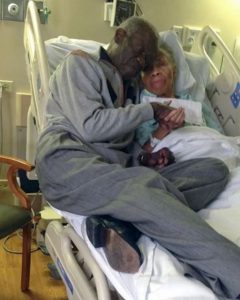Nobody told him to get into that bed at the hospital. He didn’t see a nurse wave at him or a doctor tell him he may go. He didn’t ask for permission, and no one thought he would. He just did it anyway. He moved slowly and carefully, as if it were the most natural thing in the world and that spot had been made only for him. My dad walked over the IV pole and the machines that were clicking out data and sat down next to my mom. He instinctively threw his arms over her shoulders and hugged her close in a way that only someone who has loved you for a long time can. He didn’t hold her to save her from being sick; no arms could do that. He held her to keep her company. He didn’t want her to fall asleep alone.
I couldn’t move as I stood in the doorway. I shouldn’t have gone there so late, but I did because I was restless and couldn’t sleep. I didn’t even know what I wanted. What I found was them. My parents. I’m still choosing each other and being there for each other, even in a hospital room that is antiseptic and cold and only has the glow of machinery and a small overhead light.

My mom was lying close to him. Her face was pale from the chemotherapy, and her hair was thin under a knitted cap that someone from the cancer clinic had made for her. But she didn’t look sick at that time. She looked like a lady who was at ease, held in the arms of the guy she had created her life with. It was so wonderful that it was hard to put into words. It wasn’t romantic like stories claim it is. No flowers or poems were there. It was just being there. Just touch. It was a love that never wavered.
They didn’t notice me right away. They might not have needed to. I watched them for a long time before my dad turned around and saw me. He didn’t say anything; he just looked at me with a tired but strong stare. Then, with the smallest of gestures, he touched the empty space on the edge of the bed. It was just big enough for one person, not three. But the gesture was more than just making space. It was a request for you to be there. An invitation to quit pretending and face what hurt.
I approached slowly toward them, not knowing if I should be there. I wanted to go away again, back to my distractions and the idea that everything will be OK soon. But something stopped me from going. I sat on the edge at first, then I leaned in and clutched my mom’s hand. It felt soft, but it was a lot smaller than I remembered. The chemotherapy had taken more than just her hair. I took a big breath.
“I’ve been scared,” I murmured softly, not even wanting to say it out loud.
Dad didn’t look shocked. He only nodded and kept looking at her. He said softly, “You think you’re the only one?” ” Love isn’t about the simple things. It’s about being there for someone when things are hard.
The words hit me in a place I didn’t know I had locked up. I had been avoiding the hospital for so long, only visiting when I needed to check a box and keeping myself busy so I wouldn’t have to worry. But there was my father, a guy of few words, clutching my mother like she was made of light, memory, and everything good. And all of a sudden, I wanted to be like that too. I wanted to stop running away. I wanted to know how to stay.
So I stayed. I stayed there all night until the nurses switched shifts. I stayed till her breathing slowed down, and he held her hand the whole time. I stayed even though I didn’t know how to help. It was enough for me to be there.
I started returning more often in the weeks that followed. I gave my mom the books she likes the most. I went with her to her treatments and sometimes stayed quiet and other times talked about silly things that made her happy. I started leaving work a little earlier and putting off the less important things. I learnt that being brave didn’t mean not being afraid; it meant being there anyhow.
Then, after months, something happened that none of us had hoped for: she started to get better. Her health slowly began to get better. Scans became improved. She began to eat again. She spoke loudly. I hadn’t heard her laugh in a long time, but it came back, first slowly and then entirely.
We called it a miracle. The doctors were cautiously optimistic. But to me, the biggest miracle wasn’t just that she got better; it was that I did too. I stopped judging love by what people said or did and started seeing it in the calm, constant presence of being there. That was something my father always knew. There was no need for him to mention it. He lived it every day.
I still think about that night, even now I’m out of the hospital and done with my rounds of treatment. I remember how my father’s hand felt when it patted the bed and welcomed me into something holy. I remember how my mother looked when she leaned into his arms for protection. I remember what love looked like when it was hard, and that’s why I know I’ll never turn away again.
We don’t say love in long speeches. It’s not in the flowers or the huge things that happen. It’s when you go to the difficult places, hold someone close, and say without words, “You’re not alone.”
And that’s something I’ll always keep in mind.
